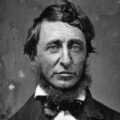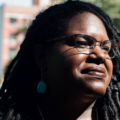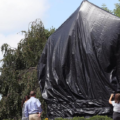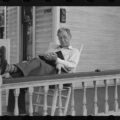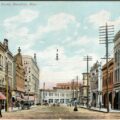Johnny and I
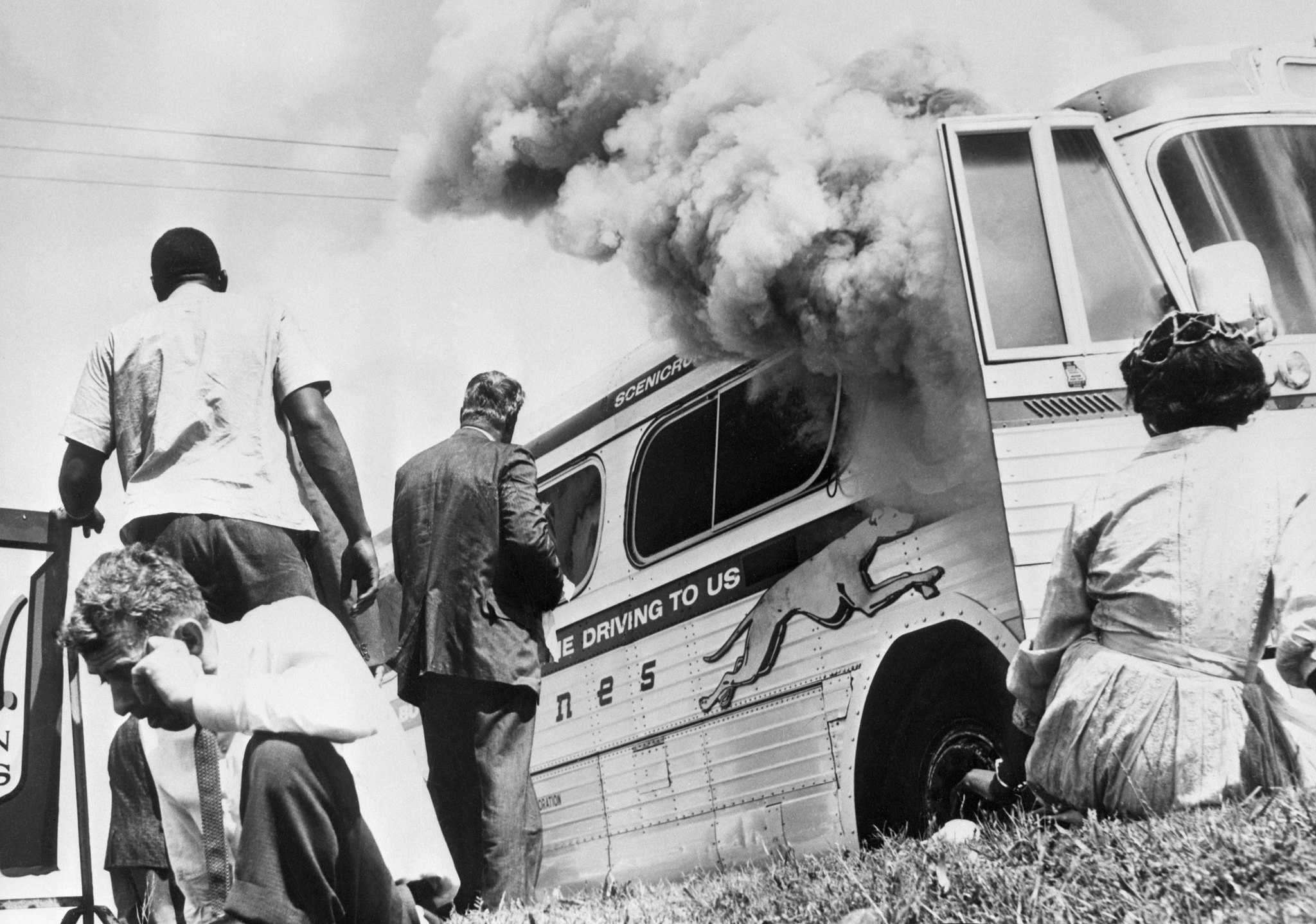
Johnny Freeman is a common name, hard to track down when all you have is a hometown and a tattered mimeographed list of campers at a defunct summer camp.
Wampanoag, with most of its records, has long since been overwhelmed by the decline of general summer camps and a building boom on Cape Cod. In its heyday after World War II, it spread out around an inlet of Buzzards Bay, surrounded by a salt marsh on one side and a wooded area behind that seemed a primeval forest to us, but did not extend more than a few hundred yards. I’ve gone back to Wampanoag and roamed around there several times, first in its very last years, when the few remaining campers clustered around me and begged, “Tell us what it was like when there were people here!” then when nothing stood but the abandoned buildings and a blackened campfire site; and more recently, when only an osage orange tree standing by what used to be the Main House still bears witness to an earlier incarnation.
Pete Fritz and I had started at Wampanoag at eight years old, sleeping the first two years in the junior cabins, then graduating to the four-man tents of the intermediates and seniors. We dressed in gray shorts and t-shirts, and all looked so much alike, tow-headed and sunburned, that our own parents couldn’t easily tell us apart when they came to visit, which was only once a summer, at most. We had left our families behind, and the camp became our community. We learned skills and crafts. We played elaborate two-day war-games modeled on military training. By the time we were eleven or twelve, Pete and I knew our way around. Pete was on track to become the camp equivalent of an eagle scout in a few years. I trailed along.
Johnny Freeman did not know his way around. He was a troublemaker and a tantrum kid, a one-monther, not a two-monther, who came to us from the Deep South for two summers in a row, in 1956 and 1957. His parents did not visit at all. How he got to Wampy we never knew; most of the other campers came from no farther away than New Jersey, with the great majority from New York and from New England and a few, directly connected with the camp directors, from as far away as Ohio. My guess is, somebody who knew somebody knew somebody who thought a responsible sleep-away camp in New England would help straighten Johnny out.
In those days before the Civil War centennial, North and South were much farther apart than they are now. For most of us at camp, the South was a land of souvenir Confederate dollars and “Hell no, we ain’t fergittin’!” regalia. It was an innocent, heroic, white-boy nostalgia of gray costumes and rebel yells. Johnny’s distant provenance and his accent were exotic among the fiddler crabs and sailboats of our daily life. For me, who hero-worshiped Robert E. Lee and fixated on the Confederacy in my Landmark-book reading of American history, he was more than exotic: he was authentic. Even his name, like Johnny Reb, felt right. When he went home, he and I wrote a few letters back and forth, pen-pal style, but didn’t really keep in touch.
Johnny’s second summer at Wampanoag, he ran away from camp. He had rubbed someone the wrong way, or someone had rubbed him the wrong way, and instead of fighting, he took off into the woods. He didn’t go very far, but it felt like a long way off. He built himself a little lean-to among the scrubby pines. Pete and I took good care of him. We smuggled food and blankets out to his den, convinced we were fooling the whole camp. In adult retrospect, I am sure that the counselors knew exactly where he was and what we were doing, and, in their wisdom, they let us do it. They taught him one lesson by their deliberate inattention, and he returned to camp on his own after a couple of nights. They taught Pete and me other lessons about responsibility, friendship, and loyalty. It was that kind of camp.
In 1960, I didn’t spend the summer at Wampanoag. Instead, I bicycled through the Canadian Rockies for six weeks with an American Youth Hosteling group, then took off on my own for a couple of weeks riding around Cape Cod—yes, I stopped off to visit Pete Fritz, now a junior counselor at Wampanoag—before entering a new high school in the fall. As years went by, my fascination with the Confederacy had been fueled by a flood of centennial commemorative books and a deeper interest in American history, a broader perspective. I became more and more aware of the larger world. These were also years in which the South I had been learning about showed itself to be a far darker and more complicated culture than I’d imagined.
During the spring of 1961, busses of Freedom Riders rolled through Georgia, Alabama, and into Mississippi, catching the attention of the national news media. On Mother’s Day, May 14, the Freedom Riders tried to get through Anniston, Alabama. The subsequent mob violence and spectacular burning of one of the Greyhound buses dominated news for a few days. But while public attention focused on the flames and the victims—stunned and frightened courageous passengers, grown-up white men and teenagers armed with baseball bats and iron pipes, black smoke billowing in a cloudless sky—I was scanning the background.
Who the hell in suburban New York had ever heard of Anniston, Alabama? I had. It was an address on an envelope. Anniston was where Johnny Freeman was from, and where he went back to when he left Camp Wampanoag in 1957. In 1961, searched those black-and-white news clips and photos for Johnny’s face, but didn’t find it. Would I have recognized him if he had been there? There must have been a lot of towheaded, sunburned, sixteen-year old boys in that crowd. They all looked a lot like troublemakers and tantrum kids. They all looked like kids I’d gone to summer camp with.
Only three years later, I went south myself, as a civil-rights volunteer. Because of that earlier infatuation with the Confederacy, I experienced the South differently from most of the other white volunteers in the Summer Voting Project known as Freedom Summer. During two summers in Mississippi, I lived and worked exclusively in Black communities. My only contact with white people was wary, confrontational and—for the most part—at a distance. Through those summers, I never stopped wondering about Johnny Freeman. I looked for him in unknown white faces in photographs and in the streets around me. He represented a complexity beyond the black-and-white of history and politics. Johnny kept me open and Johnny kept me honest. It was not until 2014, after many returns, that I first crossed the railroad tracks in that small town in northwest Mississippi I had been most familiar with, to walk among well-kept white houses in the well-kept white neighborhood. Johnny wasn’t there.
Beginning in the 1980s, I had begun to meet people in those white communities of the Deep South I still loved the more I knew of it. One by one, I learned more of the back-stories of places where I had worked. From a poet in Jackson twenty years later, I learned that white Millsaps College students had wanted to connect with the freedom workers, but they had no idea how. Since those first volatile days in 1964, I’ve met a lot of Southern white men my age. Some of whom have ruefully admitted to having been among the name-callers and stone-throwers who confronted freedom workers. Others had chosen to welcome the earth-shaking changes the civil rights movement had brought to their towns and counties. In their own time, they also had been sixteen-year old troublemakers and tantrum kids, acting out the pathology of their society or standing against it as best they knew how—sometimes both at the same time.
As a drunken teenager in Batesville, John Howell and his buddies had stalked our Freedom House on Saturday nights. The son of the editor of the Panola County weekly newspaper The Panolian, he also had hidden himself in a back room to overhear the conversation between the freedom workers and his father. And as the editor of The Panolian himself twenty years later, he celebrated in print the life and work of the local leader of the civil rights movement, whose house he might have come close to fire-bombing two decades before. Forty years on, Howell introduced the veterans of his county’s Freedom Summer project to the Batesville Rotary Club—still, it must be said, predominantly white and male. I searched among the faces and histories of these contemporaries of ours, too, for Johnny Freeman, but I didn’t find him. Instead, there was a man who reminisced:
“One day, when you guys were trying to register voters at the courthouse, my father—he had his own independent business reconditioning football helmets—loaded my sister and me into our pick-up truck and drove me down to the courthouse square. He dropped us off and told us, ‘You watch this. History is being made here.'”
The likelihood is that Johnny Freeman’s father did not drive him down to watch history being made when the Freedom Riders tried to roll through Anniston, Alabama. I can hope, on the other hand, that his father did not drive him down to be a face in those photographs I had stared at. I don’t want to have to question my responsibilities, friendships, and loyalties if we ever meet again.
About J. Kates
J. Kates born in 1945, in White Plains, New York, volunteered for the Mississippi Summer Project after his freshman year at Wesleyan University, and spent that summer helping to implement a special court order encouraging voter registration in Panola County. In the fall of 1964, he organized a Friends of SNCC/COFO in Paris, France, to support the work of the American civil-rights movement. He returned to Mississippi in 1965, working in Natchez, and later became a public school teacher, a nonviolence trainer for interpersonal and political movements, a poet and a literary translator. Since 1997, he has co-directed the non-profit literary publishing house Zephyr Press, publishers of Letters from Mississippi: Reports from Civil Rights Volunteers & Poetry of the 1964 Freedom Summer. A contributor to the anthologies What Does It Mean to Be White in America? and Black Lives Have Always Mattered, he is also a member of the Veterans of the Mississippi Civil Rights Movement.

